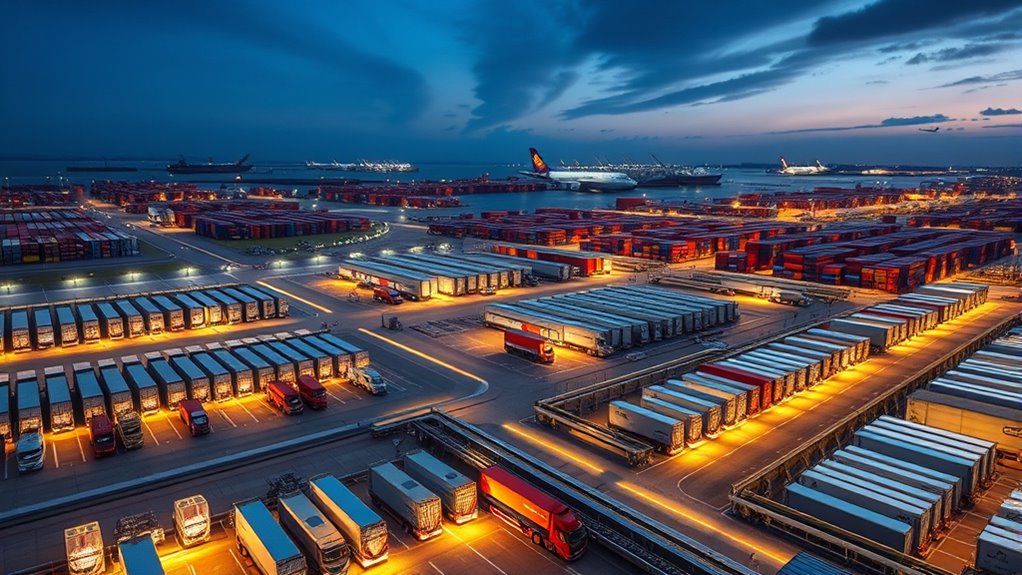Supply chain management coordinates the entire process of producing and delivering products, from raw materials to final customers. It encompasses critical functions like supplier relationships, manufacturing control, inventory management, and distribution logistics. Companies use advanced tracking systems and data management to optimize operations, reduce costs, and meet customer demand effectively. Modern supply chains require careful planning, risk management, and ethical practices – essential elements for business success in today’s interconnected marketplace.

Supply chain management stands as the backbone of modern business operations, encompassing the end-to-end process of creating and delivering products to consumers. This complex system begins with careful planning and analysis, where companies determine their operational strategies, including vital decisions about manufacturing locations and production methods. These initial planning stages set the foundation for successful supply chain execution by establishing clear performance metrics and risk management protocols. Companies must also evaluate whether to pursue domestic versus international suppliers based on cost, quality, and reliability factors.
At the heart of supply chain management lies the essential function of sourcing and supplier relationships. Organizations must carefully select and manage relationships with suppliers who can provide quality materials at competitive prices while maintaining reliable delivery schedules. This process requires thorough vetting, contract negotiation, and ongoing performance assessment to guarantee suppliers align with production demands and quality standards. Global companies like Starbucks demonstrate the scale of modern sourcing, managing relationships with 300,000 coffee growers worldwide.
Successfully managing supplier relationships requires strategic selection, continuous evaluation, and strong partnerships to ensure quality materials and reliable deliveries.
Manufacturing and production control transforms raw materials into finished goods through carefully orchestrated processes. Companies may choose to manufacture entirely in-house or partially outsource production, depending on their strategic objectives. Quality control systems are integrated throughout the manufacturing process, while coordination with inventory and distribution teams helps minimize lead times and maintain efficiency. Ethical practices have become increasingly important in modern manufacturing operations.
Effective inventory management serves as a vital link between production and distribution. Modern tracking technologies help organizations maintain ideal stock levels while reducing costs associated with excess inventory or stockouts. This delicate balance requires careful coordination between warehousing operations and production schedules to meet fluctuating customer demand.
Distribution and logistics guarantee products reach their intended destinations efficiently and cost-effectively. This involves enhancing transportation routes, coordinating with multiple logistics partners, and managing product returns when necessary. Advanced tracking systems provide real-time visibility throughout the delivery process.
Information systems and data management tie these various components together, enabling better decision-making through advanced analytics and forecasting. Digital platforms facilitate communication between supply chain partners while automating routine processes to reduce errors and delays. This technological integration has become increasingly important as supply chains grow more complex and globally interconnected.
Frequently Asked Questions
How Can Small Businesses Compete With Larger Companies in Supply Chain Management?
Small businesses can compete effectively through strategic supplier diversification, technology adoption, and collaboration.
By partnering with multiple suppliers, implementing inventory management systems, and leveraging online platforms, they can enhance operational efficiency.
Strategic inventory buffers and flexible manufacturing partnerships enable quick response to market changes.
Additionally, joining forces with other small businesses to share resources and utilizing risk management tools helps level the playing field against larger competitors.
What Cybersecurity Measures Protect Supply Chains From Digital Threats?
Essential cybersecurity measures for supply chains include implementing Zero Trust Architecture, which verifies every access request, and deploying advanced threat detection systems for real-time monitoring.
Organizations must utilize next-generation firewalls, endpoint protection solutions, and multi-factor authentication to secure network perimeters.
Regular vulnerability assessments, coupled with privileged access management and honeytoken deployment, help identify and remediate security gaps while providing early breach detection capabilities.
How Does Weather Affect Global Supply Chain Operations?
Weather events markedly disrupt global supply chains through multiple channels.
Extreme conditions like floods and hurricanes damage infrastructure and delay transportation, while heat waves force factory shutdowns and reduce worker productivity.
Agricultural supply chains face particular vulnerability, with crop yields declining approximately 5% due to climate volatility.
Natural disasters cause billions in economic losses, affecting everything from shipping routes to warehouse operations.
The Panama Canal’s drought-related slowdowns exemplify how weather impacts essential maritime trade arteries.
Which Technologies Will Revolutionize Supply Chain Management in the Next Decade?
Several key technologies will transform supply chain management by 2035.
AI and machine learning will optimize operations through autonomous decision-making and enhanced forecasting.
IoT connectivity will enable real-time tracking with over 75 billion connected devices.
Robotics and autonomous vehicles will revolutionize logistics and warehouse operations.
Quantum computing will process complex data instantly, solving intricate routing and inventory challenges while reducing operational costs and delivery times.
What Environmental Certifications Are Important for Sustainable Supply Chain Practices?
Several key environmental certifications validate sustainable supply chain practices.
The Certified Sustainable Supply Chain Professional (CSSCP) certification focuses on integrating sustainability principles and UN SDGs.
The Chartered Sustainable Supply Chain and Logistics Professional (CSSCLP™) emphasizes green logistics and GHG compliance.
Additional important certifications include ASCM Supply Chain Sustainability Standards, LEED for sustainable warehousing, and GOTS/FSC for responsible product sourcing and design.









